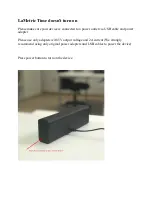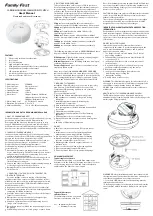
Installation Instructions
DS240 and DS241
Long Range Beam Smoke Detectors
1.0
Description
The DS240 and DS241 are long range projected beam type smoke
detectors which consist of a separate transmitter and receiver. Internal
pointability provides coverage flexibility without the need for brackets.
Automatic Signal Synchronization and Range Adjustment reduce
installation costs. Selectable sensitivity and alarm response time
provide installation flexibility.
2.0
Specifications
• Operating Voltage: DS240: 18.0 VDC to 32.0 VDC
DS241: 10.2 VDC to 15.0 VDC
• Standby Current:
DS240: Receiver: 45 mA @ 24.0 VDC
Transmitter: 20 mA @ 24.0 VDC
DS241: Receiver: 50 mA @ 12.0 VDC
Transmitter: 20 mA @ 12.0 VDC
• Receiver Alarm
Current:
DS240: 60 mA @ 24.0 VDC
DS241: 75 mA @ 12.0 VDC
• Range (distance
between transmitter
and receiver):
30 ft to 350 ft (9 m to 107 m)
• Spacing (distance
between systems): Allow no more than 60 ft (18 m) between
systems. Sixty foot spacing is confirmed
by Underwriters Laboratories, Inc. testing.
• Pointability:
Internally pointable optics for ±90°
horizontal, and ±10° vertical adjustment.
• Sensitivity:
Field selectable for 20, 30, 40, 50, 60, or
70 percent beam obscuration.
• Alarm Contacts:
Normally Open contacts rated 1 A,
60 VDC maximum for DC resistive loads.
Do not use with capacitive or inductive
loads.
• Trouble Contacts:
Normally Closed contacts rated 1 A, 60 VDC
maximum for DC resistive loads. Do not
use with capacitive or inductive loads.
• Aux. Alarm
Contacts:
Form "C" (NO, C, NC) contacts rated 1 A,
60 VDC maximum for DC resistive loads.
Do not use with capacitive or inductive
loads.
• Tamper:
Receiver:
Access door tamper switch in
series with trouble contacts.
Transmitter: Upon cover’s removal, cover
tamper switch interrupts
transmission.
• System Signaling:
Conventional 4-wire system. Not for use
with systems that incorporate an alarm
verification feature.
• Signal Delay:
Fire:
Selectable 30 sec or 5 sec
Trouble:
20 ± 2 sec
• Temperature:
The storage and operating temperature
range is -22°F to +130°F (-30°C to +54°C).
For UL Listed installations, the range is
+32°F to +130°F (0°C to +54°C).
• Mounting:
The units are designed to be mounted to
4 in. (10 cm) square or octagonal
electrical boxes (not supplied).
• Listings and
Approvals:
UL
S3019
ULC
CS692
MSFM
Permit #1943
NY City MEA
Acceptance #MEA274-93-E
CSFM
#7260-1062:106
FM
Job #OX2A9.AY
• Standard
Accessories:
DIS2000 Remote Test/Indicator Plate and
Test Cable
• Options:
DIS240 Remote Indicator Plate, TK240
Field Test Kit, AL240 Alignment Light, and
TC2000 Test Cord.
3.0
Principle of Operation
Each DS240 or DS241 beam smoke detector has a separate
transmitter and receiver. The transmitter transmits an invisible infrared
beam of a specific frequency and intensity. The receiver detects, then
measures the beam’s intensity (see
Figure 1).
Figure 1 - Infrared Transmission
As the beam is obscured by smoke, the receiver senses a decrease
in the signal strength and measures that decrease. The receiver
compares the signal level with two preset thresholds: an alarm
threshold which is set using the sensitivity switch and a trouble
threshold which is preset at approximately 10%. If the signal falls
below the alarm threshold for the programmed alarm period, the
receiver signals an alarm (see
Figure 2).
Figure 2 - Beam Obscuration
If the signal falls below the trouble threshold for more than 20 sec,
such as might happen if the beam is blocked by a foreign object, the
receiver signals a trouble condition (see
Figure 3).
Figure 3 - Beam Blockage
The receiver automatically compensates for the gradual loss of signal
due to dust/dirt build-up on the cover. After 50 percent of the signal is
lost, the receiver will indicate a trouble. When the dust/dirt build-up is
cleaned or the blockage is removed, the detector automatically goes
back to its normal operation level.
A trouble will be indicated at the receiver if the beam strength is
increased by more than 20% for greater than 20 sec. Causes include
improper initial alignment or the removal of a partial beam blockage
at the time of alignment. Preform a fine-tune alignment (see
Section
7.3 Fine Tune Alignment on page 6).
Downloaded from:
http://www.guardianalarms.net






























